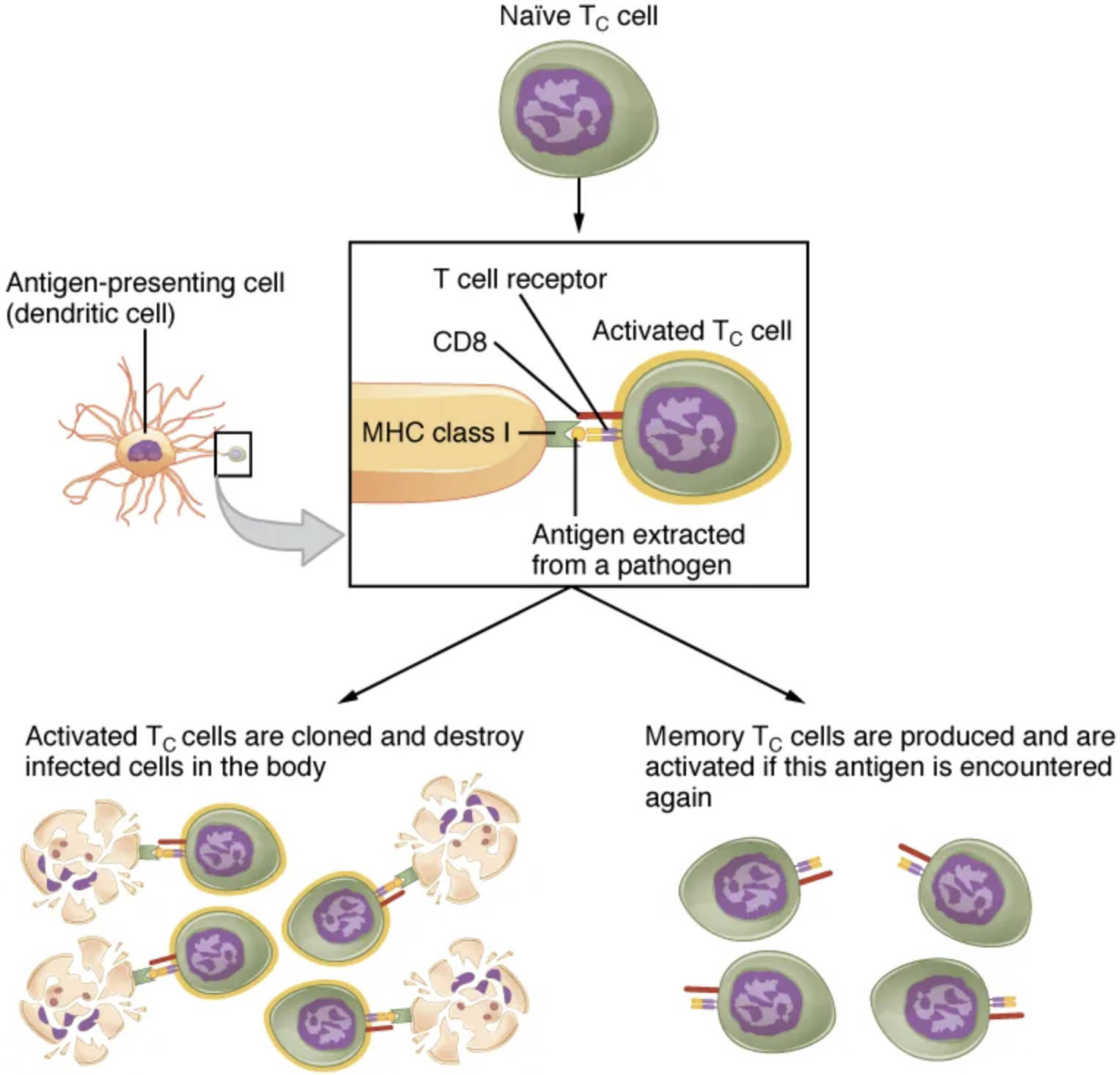Clonal selection and expansion are fundamental processes that enable the immune system to mount a targeted response against specific pathogens, beginning with the differentiation of stem cells into T lymphocytes with unique receptors. When a pathogen introduces antigens, T cell clones with matching receptors are selected and proliferate to amplify the immune reaction, ensuring effective defense. This detailed illustration provides a clear depiction of how this dynamic process shapes the adaptive immune response.

Labeled Components of Clonal Selection and Expansion
Stem cell: Originating in the bone marrow, this multipotent cell differentiates into T cell precursors. It provides the foundation for generating a diverse T cell population.
T cell precursor: This intermediate cell migrates to the thymus for maturation after leaving the bone marrow. It undergoes selection to become a functional T lymphocyte.
T cell (naive): Newly matured in the thymus, this T cell expresses a unique T cell receptor (TCR) but has not yet encountered its specific antigen. It circulates awaiting activation.
T cell clone: A group of T cells with identical TCRs, derived from a single naive T cell, recognizes a specific antigen. This clone expands upon antigen encounter to mount an immune response.
Antigen: A foreign molecule from a pathogen, such as a protein or peptide, triggers the immune system. It binds to the TCR of a matching T cell clone to initiate selection.
T cell receptor (TCR): This receptor on the T cell surface binds to a specific antigen presented by MHC molecules. Its unique structure determines the T cell’s antigen specificity.
MHC molecule: This major histocompatibility complex molecule presents the antigen to the TCR on the T cell surface. It ensures proper antigen recognition and T cell activation.
Activated T cell: Upon antigen binding, this T cell undergoes proliferation and differentiation into effector or memory cells. It drives the immune response against the pathogen.
Effector T cell: Derived from activated T cells, this cell performs functions like cytokine release or cytotoxicity. It directly combats the infection during the active phase.
Memory T cell: Formed during expansion, this long-lived cell retains antigen specificity for future encounters. It enables a faster response upon re-exposure to the same pathogen.
Proliferation: This rapid division of activated T cells increases the clone size to fight the infection. It occurs after antigen recognition to amplify the immune effort.
Cytokines: These signaling molecules, released by activated T cells, enhance immune responses and recruit other cells. They support the expansion and differentiation process.
Anatomical Context of Clonal Selection
Clonal selection occurs as T cells circulate and interact with antigen-presenting cells throughout the body.
- Stem cells in the bone marrow give rise to T cell precursors that migrate to the thymus.
- Naive T cells patrol lymphoid tissues, awaiting antigen encounter.
- T cell clones emerge when a specific TCR matches an antigen-MHC complex.
- Activated T cells proliferate in response to the antigenic stimulus.
- Effector T cells target the infection site, while memory T cells remain in circulation.
- Cytokines facilitate communication, enhancing the clonal expansion.
This illustration highlights the journey from stem cell to active immunity.
Physiological Role in Immune Response
Clonal selection and expansion tailor the immune system to specific threats.
- Stem cells continuously supply T cell precursors, maintaining the T cell pool.
- Naive T cells recognize antigens, triggering the selection of matching clones.
- T cell receptors bind antigens with high specificity, initiating activation.
- Proliferation amplifies the selected clone, boosting the immune force.
- Effector T cells release cytokines, coordinating the attack on pathogens.
- Memory T cells provide long-term protection against re-infection.
This process ensures a robust and adaptable immune defense.
Mechanisms of Clonal Expansion
The expansion phase involves precise molecular and cellular interactions.
- Antigen presentation by MHC molecules activates the matching TCR.
- Activated T cells undergo rapid proliferation, doubling their numbers.
- Cytokines like IL-2 stimulate T cell growth and differentiation.
- Effector T cells develop specific functions, such as cytotoxicity or help.
- Memory T cells are set aside, preserving the clone’s specificity.
- This expansion peaks during the acute phase of infection.
These mechanisms amplify the immune response effectively.
Clinical Relevance of Clonal Selection
Understanding this process aids in managing immune-related conditions.
- Defective clonal selection can lead to immunodeficiencies, reducing T cell diversity.
- Overactive expansion may contribute to autoimmune diseases, targeting self-antigens.
- Memory T cell impairment affects vaccine efficacy, slowing secondary responses.
- Cytokine storms from excessive proliferation can cause severe inflammation.
- T cell receptor mutations are studied in cancer immunotherapy resistance.
- Monitoring effector T cell activity helps assess infection severity.
This knowledge supports targeted treatments and diagnostics.
Developmental and Adaptive Features
Clonal selection adapts to the body’s changing immune challenges.
- Stem cells differentiate throughout life, replenishing the T cell pool.
- T cell precursors mature in the thymus, gaining TCR diversity.
- Naive T cells gain specificity through antigen exposure over time.
- Proliferation rates adjust to the intensity of the antigenic challenge.
- Memory T cells evolve, improving responses with each encounter.
- Cytokines fine-tune the expansion process based on immune needs.
This adaptability ensures ongoing protection against diverse pathogens.
Clonal selection and expansion of T lymphocytes, as illustrated, represent a remarkable strategy for tailoring the immune response to specific antigens. From the differentiation of stem cells to the proliferation of activated clones, this process equips the body with both immediate fighters and long-term memory, making it a captivating area of study for those interested in immune health and resilience.

